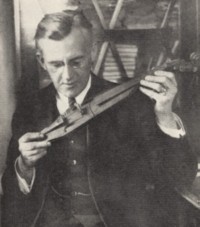| A | B | C | D | E | F | G | H | I | J | K | L | Ł | M | N | O | P | R | S | T | U | V | W | Y | Z |
 Adolf Chybiński,
Adolf Chybiński,
musicologist, music historian, music ethnographer, teacher, founder of musicological studies at the universities in Lviv and Poznań; b. 29th April 1880 in Kraków; d. 31st October 1952 in Poznań. He took his first piano lessons in Kraków with Jan Ostrowski, Antoni Szybalski and Alfons Szczerbiński. In 1891-1898 he received private lessons on piano and music theory from Jan Drozdowski. Contrary to his musical interests, he took up legal studies at the Jagiellonian University in Kraków in 1898-99. In 1899-1901 and 1902-04 he also studied classical philology (with Kazimierz Morawski and Leon Sternbach) and German studies (with Wilhelm Creizenach) at the Faculty of Philosophy. In 1901-1902 he studied in Heidelberg. From 1904-1908 he studied musicology (with Adolf Sanberger and Theodor Kroyer), art history (with Berthold Riehl and Karl Vol), history of German literature (with Karol Borinski and F. Muncker) and philosophy (with Teodor Lipps) in Munich. In 1905-07 he also took private counterpoint and composition lessons with Ludwik Thuille. In 1908 in Munich he defended his doctorate Contributions to the history of the timing and the Kapellmeisteramt in the epoch of Mensuralmusik (Beitrage zur Geschichte des Taktschlegens und des Kapellmeisteramtes in der Epoche der Mensuralmusik). He continued his researches into the history of Polish music for several years in Munich, preparing a post-doctoral dissertation under the guidance of Guido Adler. He defended it in 1912 (The mensural theory in Polish music works of the first half of the sixteenth century) at the Jan Kazimierz University of Lviv and became a lecturer and head of the Department of Musicology of this university. From 1917 he was an associate professor at the University of Lviv, from 1921 a full professor; in 1928-1929 he was the dean and in 1929-1931 the deputy dean of the Faculty of Humanities. In 1916-1928 he also lectured on theoretical subjects at the Conservatory of the Polish Music Society in Lviv. After the first World War, he became a professor at Poznań University, and headed the Department of Musicology and lectured on the history of Polish Early music, Polish musical folklore and music theory. For a short time in 1948, he was the director of the Poznań Opera. He also chaired the Theoretic Section of the Music School Programming Committee and the State Music Publishing Council. In his academic research he dealt with the history of the Polish Renaissance and Baroque music as well as musical ethnography. He studied the works of, among others Mikołaj Gomółka, Jan z Lublina and Jacek Różycki. He was the initiator of making copies of XV–XVIII-century music manuscripts, and discovered many unknown monuments of Polish music from that period. He edited 22 issues of the Editions of Old Polish Music series (1928-1951), and the individual works of early composers. He initiated research on Polish musical folklore and the collecting of folk songs. He devoted a great deal of attention to highlander music – the culture, as well as the nature of Podhale. Mountaineering was his passion, and he worked with The Tatra Museum in Zakopane for many years. He demonstrated the affinity of some melodies of Polish Tatra highlanders to the melodies of Czech, Slovak and Hungarian highlanders. In 1951, he published a collection of lesser-known melodies and folk songs From the Tatra Mountains to the Baltic Sea (Śpiewnik krajoznawczy – od Tatr do Bałtyku), and was one of the editors of the work Analysis and explanation of the works of Frédéric Chopin (Analiza i objaśnienia dzieł wszystkich Fryderyka Chopina). In addition, he worked as co-editor of "Kwartalnik Muzyczny" (1928-1931, 1948-1950) and "Polski Rocznik Muzykologiczny" (1935-1936). During the German occupation he gave private music lessons and worked as a translator for a social insurance company. In 1945 Chybiński received a chair at the University of Poznań and headed the Faculty of Music here until 1952. In 1949 appeared the first volume of his monograph on Mieczysław Karłowicz, and in 1950 he received an honorary doctorate from the University of Poznań. In 1952 he became an honorary member of the Polish Academy of Sciences. In 1929 he became a correspondent member and in 1945 an active member of the Polish Academy of Learning; shortly before his death, he was granted the title of a full member of the Polish Academy of Sciences (1952). In the years 1948-1949 he was a member of the Polish Academy of Learning Musicological Commission, and from 1920 the Scientific Society in Lviv. In 1948 he was one of the founding members of the Polish Composers' Union and the vice-president of the Musicology Section. In addition, he was active in the Poznań Society of Friends of Sciences and the Polish Tatra Society (honorary member). He was honored with two memorial books (1930 and 1950). Among his friends he numbered Mieczysław Karłowicz, Grzegorz Fitelberg, Ludomir Różycki, Karol Szymanowski, Jarosław Iwaszkiewicz, and Jan Gwalbert Pawlikowski . His students included Józef Michał Chomiński, Zofia Lissa, and Stefania Turkewich. In 1947 he was awarded the Poznań Province Prize for his work, and in 1951 he received the State First Degree Award. He was awarded the Commander's Cross of the Order of Polonia Restituta (1929), the Golden Cross of Merit (1937) for merits in the field of science and pedagogy for research on Polish early music, and the Order of the First Class Work Banner (1951) in connection with the 50th anniversary of musicological activity. updated: 2020 (ac) |

|